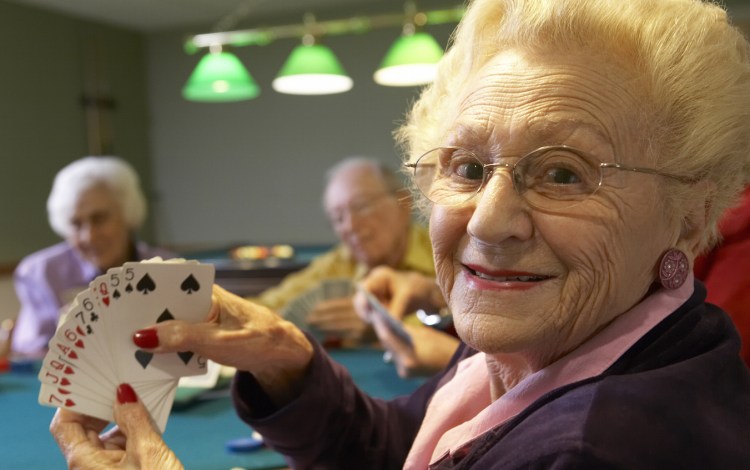The mean age of bridge players in North America may be 65 but this is not the downward trend you might think it is.
Get smart, stay smart

Bridge is the secret to adult neurogenesis.
The mean age of bridge players in North America may be 65 but this is not the downward trend you might think it is.
by Jude Goodwin
You’ve likely heard phrases like ‘aging population’ and read opinions that the ACBL is about to ‘fall off a cliff’ in terms of membership. In fact the opposite is true!
The ACBL, North America’s over arching bridge organization, is growing at the rapid rate experiencing an increase in new member recruitment by 32.9% compared to the previous year as of mid-2023 – and almost all of these new members are over 60 years of age. The reason for this is science. We have learned something wonderful over the past decade and it has changed our way of thinking and behaving during retirement.
Recent neurological studies have revealed the human brain does not have to diminish with age.
In fact, the neurons in our brains, those cells that transfer information, can increase in quantity throughout adulthood. This process is called adult neurogenesis and is key to functions such as learning, problem solving, and memory.
And how to we get our brain cells to replicate and grow in number? The same studies have also shown that that it’s the way we live our lives that will determine how our own brains and abilities continue to grow and strengthen as we age.
The process of neurogenesis is profoundly affected by the way you live your life. The brain’s anatomy, neural networks, and cognitive abilities can all be strengthened and improved through your experiences and interactions with your environment. Cognitive Fitness by Roderick Gilkey and Clint Kilts, Harvard Busienss Review
There are two very important ingredients required for adult neurogenesis to take place.
Cognitive Workouts – you need to exercise your brain.
Did you know you can actually make physical changes in your brain by learning new skills? Advances in neuroscience have shown that you can be as sharp at 65 as you were at 25. But you need to exercise your brain. The more fit your brain is, the better it is able to make decisions, solve problems and deal with stress and change. And the more open your mind is the better it can grasp new ideas and learn.
One of the best cognitive workouts for your brain is to play games. Play helps you reason, expand your imagination and your curiosity. Games like Chess, Checkers, and Go are all well loved and challenging games. But some of the best games in the world are played with a deck of cards. This little stack of 52 cardboard rectangles has such an infinite variety of combinations and ‘deals’ the challenge to cognitive fitness is endless. Poker, Blackjack, Pinochle, Euchre and of course, bridge! Many of us believe bridge is the most challenging, fun, and rewarding game in the world.
In order for a game to promote neurogenesis it needs to present some ‘risk’ – you need to have a stake in the game in order to activate your neurons. This encourages you to make ongoing effort and continue to learn more about the game, at the same time continuing to grow your capacity to think, imagine and problem solve.
Social Interaction – staying socially connected is key to healthy aging
A second important ingredient to cognitive health well into our 80s and 90s is social interaction.
“There is quite a bit of evidence now suggesting that the more people you have contact with, in your own home or outside, the better you do” mentally and physically, Dr. Kawas said. “Interacting with people regularly, even strangers, uses easily as much brain power as doing puzzles, and it wouldn’t surprise me if this is what it’s all about.” At the bridge table, clues to a lucid old age.
The game of bridge is ideally suited to this kind of social interaction. At the bridge table at home or at the club we get to know people, discuss strategies and possibiliites, challenge our memories and problem solving skills together, and laugh. And it’s been proven that people who interact socially live longer and have improved immune systems as well.
Today, the American Contract Bridge League has over 165,000 members and half of these members have fewer than 200 mps.
MPs, or masterpoints, are the ‘coin’ of winning at competitive bridge around the world and because friendly competitions is part of the game’s challenge, everyone has a stake and strives to improve … generating new neurons at the same time!
Bridge is good for continued health in seniors because of its cognitive and social benefits and the 60+ generation is rushing to take advantage of this and are signing up with the ACBL by the thousands. Teachers, clubs, tournaments, and authors could benefit from an understanding of this demographic!
Interested? Here are some good resources
✓ Great Bridge Links Bridge Basics – start from square one and find your way into the game.
✓ Bridge to the People Foundation – established to conduct and finance scientific research and for social and generational integration: how playing bridge prevents dementia, strengthens the immune system and improves academic performance. Written in Polish but Google will translate that for you!
✓ BAMSA – establishing a new academic discipline, the sociology of bridge. You’ll find some amazing research projects on the Bamsa site.








